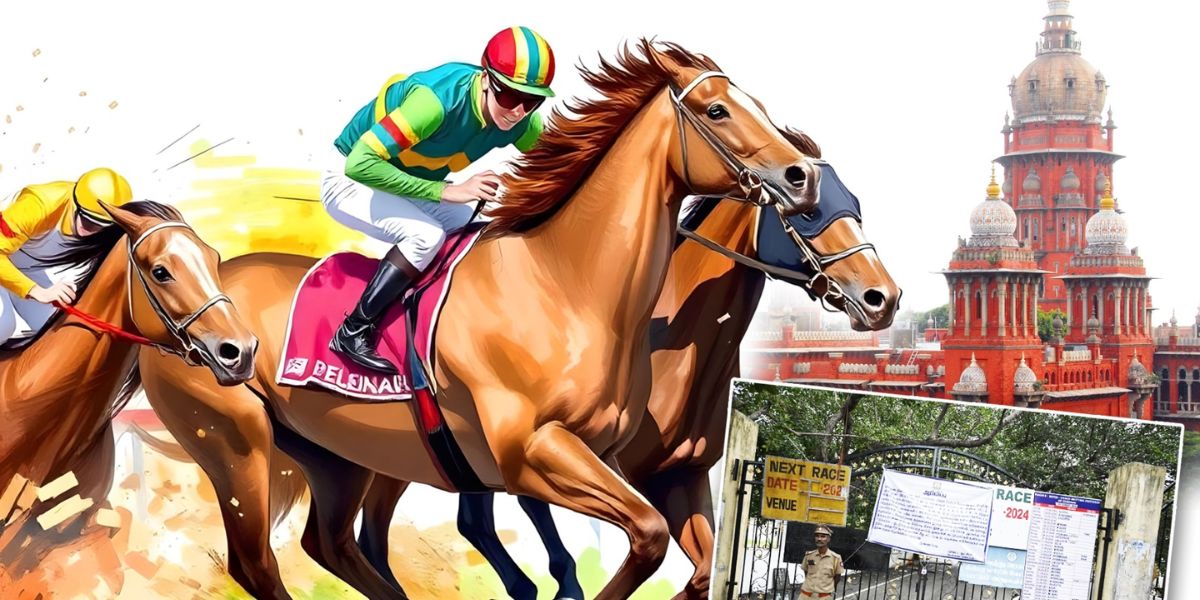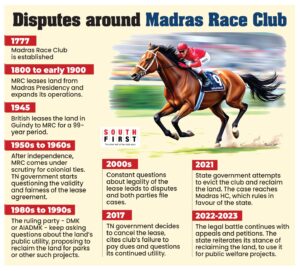Published Sep 10, 2024 | 6:46 PM ⚊ Updated Sep 10, 2024 | 6:46 PM

Representative image
The Tamil Nadu government, on Monday, 9 September, took control of the Madras Race Club (MRC) land in Chennai’s Guindy following a series of legal disputes regarding the lease and rent arrears.
Madras High Court Chief Justice Sanjay V Gangapurwala questioned the state government’s authority to revise the rent of the 160.68-acre government land leased out to MRC since 1945. The court inquired about the specific contract provisions that allow such revisions, particularly as the state government demanded a massive ₹13,111.86 crore in rental arrears from the club.
This inquiry comes over a year after the landmark decision in March 2023 by Justice S.M. Subramaniam, when the court ordered MRC to pay ₹730.86 crore in rent arrears accumulated from 1970 to 2004. The court had also directed the Tamil Nadu government to demand an additional ₹12,381 crore in rent from 2004 onwards, instructing the club to clear this amount within two months.
If MRC failed to pay the ₹730.86 crore within the stipulated time, the state was authorised to evict the club from the premises with police assistance.
The case of Madras Race Club vs. Government of Tamil Nadu involved three writ petitions filed by the Madras Race Club, represented by its Secretary, Dr SM Karthikeyan. The petitions challenged various orders and demand notices issued by government authorities, including the Tahsildar and District Collector of Chennai, regarding the club’s business activities and land usage at their premises in Guindy.
The core of the current conflict lies in the government’s insistence on rent being adjusted based on market value, which the club contests, citing the original lease agreement. The Madras High Court is now evaluating whether the government has the authority under the lease contract to revise the rent. During the hearings, Chief Justice Gangapurwala pressed for clarity on which specific contractual provision allows the government to enforce such revisions.
The MRC has struggled with the financial pressure of paying both the arrears and the revised rent, which it views as excessive and unjust. Earlier rulings from the court have sided with the state, demanding substantial payments from the club.

Timeline of events around legal conflict between Madras Race Course and Government of Tamil Nadu.
After the hearing in the case concluded on 20 March 2023, the Justice reserved the judgement and pronounced it a week later on 29 March.
The Madras Race Course, established in 1777, has been a prominent landmark for centuries in Guindy. It has also been embroiled in a protracted dispute between the Tamil Nadu government and the Madras Race Club (MRC) for decades. The central issue has revolved around the ownership of the land and its future use, with the state government arguing that the land should serve a public purpose, while the MRC maintain that it had a long-standing lease and operational rights over the racecourse.
The Tamil Nadu government’s stance has consistently been that the racecourse occupies prime real estate that could better serve the public if converted into a space for recreation, education, or infrastructure development. Proponents of this view argue that a large part of Chennai’s population is unable to access such facilities in the city, and that the racecourse, which caters primarily to an elite audience, is an inefficient use of the land.
Sriram, a resident from Chennai spoke to South First about the issue. He said that he has been closely watching the issue for a while now and that, “tax evasion is one issue that should have been addressed a long time ago. Regardless. given the land value, it has so much potential even now.”
Another resident of the city, Kalyani ,who has worked as a volunteer in several NGOs that work towards awareness based on environmental well being told South First,” The race course has mainly been used for entertainment purposes and I highly doubt it ever added to any economic value.”
Commenting on the fact that the race course is being considered a tourist place, she asked, “that means they should be making enough money right? How come, even then the club is unable to pay the rental arrears?”
“Tamil Nadu government taking over the leased land is the right move as it can potentially be used for the greater good of people,” said Jayaram Venkatesan from Arappor Iyakkam.
On the other hand, the Madras Race Club has maintained that horse racing is an important part of Chennai’s cultural and sporting heritage. The club has also pointed out that its operations generate employment and contribute to the economy through tourism and entertainment-related activities. Furthermore, the MRC has invested in maintaining the racecourse over the years and has argued that it should be allowed to continue functioning under renewed lease terms.
(Edited by Neena)
(South First is now on WhatsApp and Telegram)

